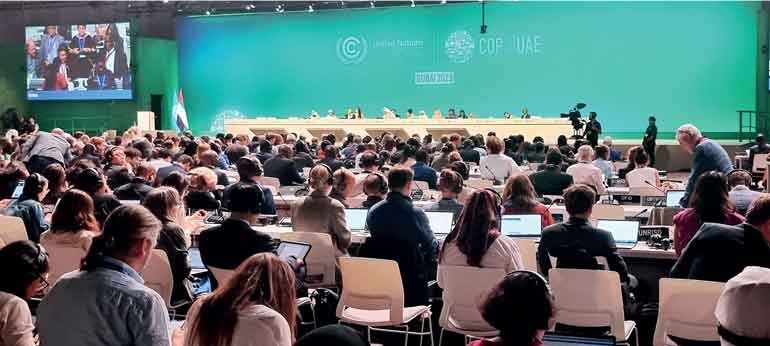Wednesday Feb 18, 2026
Wednesday Feb 18, 2026
Saturday, 23 December 2023 00:10 - - {{hitsCtrl.values.hits}}

COP28 came to a close on 13 December in Dubai, UAE, after two weeks of intense negotiations and discussions
 After two weeks of intense negotiations between almost the 200 Parties to the United Nations Framework Convention on Climate Change (UNFCCC) and the Paris Agreement, the 28th Conference of the Parties (COP28) has come to an end in Dubai, UAE. During the closing plenary, speakers highlighted some of the key areas of deliberation, including mitigation, adaptation, and climate-induced loss and damage, and the urgency of climate action in the context of complex and compound global challenges.
After two weeks of intense negotiations between almost the 200 Parties to the United Nations Framework Convention on Climate Change (UNFCCC) and the Paris Agreement, the 28th Conference of the Parties (COP28) has come to an end in Dubai, UAE. During the closing plenary, speakers highlighted some of the key areas of deliberation, including mitigation, adaptation, and climate-induced loss and damage, and the urgency of climate action in the context of complex and compound global challenges.
The COP28 President, Dr. Sultan Al Jaber, stressed the need for the COP28 outcome to keep 1.5 degrees within reach and deliver ambitious climate action. “[The COP28 decision text] is a balanced plan that tackles emissions, bridges the gap on adaptation, reimagines global finance, and delivers on loss and damage,” he further stated. UNFCCC Executive Secretary Simon Stiell underscored the importance of finance and the strong interconnection between climate action and economic transition: “At every stage, climate action must strive forward side by side with human development, dignity, and opportunity. […] The political and economic logic is increasingly insurmountable.”
The decision on the first Global Stocktake, which takes the place of this year’s COP cover decision, highlights both the urgency of addressing climate change and the significant resources required to do so. Within its preamble and first ten paragraphs, it notes that finance, capacity-building, and technology transfer are critical enablers of climate action, and that climate justice is an important principle underlying such action. Furthermore, it also notes that finance for adaptation as well as mitigation needs to increase manyfold to close the growing gaps between the needs of developing countries and the support currently provided to them.
Connecting climate change and climate finance
The COP28 decision mentions finance sixty-six times and references a range of funds and funding arrangements, including the newly established Loss and Damage Fund, the Green Climate Fund, the Adaptation Fund, the Least Developed Countries Fund, and the Special Climate Change Fund. It outlines that an estimated $ 5.8-5.9 trillion are required for developing countries to implement their Nationally Determined Contributions (NDCs) up to 2030, and that there is an estimated annual need of $ 215-387 billion in adaptation funding up to 2030.
The decision text also links to the new collective quantified goal on climate finance, which will be negotiated next year towards COP29 in Azerbaijan, and the loss and damage fund and funding arrangements, which were operationalised on the first day of COP28 and received pledges of close to $ 800 million so far. However, it acknowledges “the significant gaps, including finance,” that remain in responding to loss and damage, as well as in other areas of climate change.
As highlighted in the decision, there is an urgent need to scale up new and additional finance which is grant-based and does not create further debt for developing countries. The decision also recognises the positive connection between having sufficient fiscal space and being able to engage in ambitious climate action, which could potentially connect, among other things, to the need for addressing the rising debt burdens of many climate-vulnerable developing countries.
Climate change and the global financial architecture
There are wider implications and interconnections around the nexus of climate change, climate-induced loss and damage, and the global financial system. The COP28 decision underscores “the importance of reforming the multilateral financial architecture,” including multilateral development banks, and emphasises the roles of different financial actors towards ensuring or enhancing access to climate finance, such as governments, central banks, commercial banks, and institutional investors. It calls for significantly scaling up “the provision of climate finance in particular through grants and concessional instruments,” accelerating “the ongoing establishment of new and innovative sources of finance, including taxation,” scaling down harmful incentives, and “building on existing institutions and mechanisms such as the Common Framework.”
The need to acknowledge climate risks as both as a reason for and a barrier to accessing finance is crucial for countries of the Global South such as Sri Lanka, who are facing the increasing impacts of climate change in the context of macroeconomic challenges and existing debt. Climate impacts are increasing in scale and frequency, which results in economic and non-economic loss and damage, reduced fiscal space, and constraints towards achieving the 2030 Sustainable Development Goals.
The way forward
COP28 has brought attention to the significant and increasing need for climate finance related to economic transition, adaptation, and addressing loss and damage, which is especially important for vulnerable developing countries that are operating in challenging economic circumstances and with severely restricted fiscal space.
Going forward, it will be important to explore the interlinkages and potential synergies between the global financial architecture, climate finance, and sovereign debt both within and beyond the UNFCCC process. Initiatives, platforms, partnerships, and funds, such as the Bridgetown initiative, the Ubuntu initiative, Sri Lanka’s Climate Justice Forum, the New Global Financing Pact Summit, the World Bank Evolutionary Roadmap, or the IMF’s Catastrophe Containment and Relief Trust, provide options and potential pathways for reform. Furthermore, further research could help to identify opportunities within the nexus that allow countries to better manage compound risks and enhance their long-term economic resilience and prosperity.
(The writer works as Director: Research and Knowledge Management at SLYCAN Trust, a non-profit think tank based in Sri Lanka. His work focuses on climate change, adaptation, resilience, ecosystem conservation, just transition, human mobility, and a range of related issues. He holds a Master’s degree in Education from the University of Cologne, Germany and is a regular contributor to several international and local media outlets.)